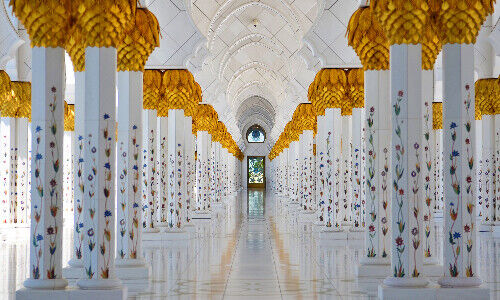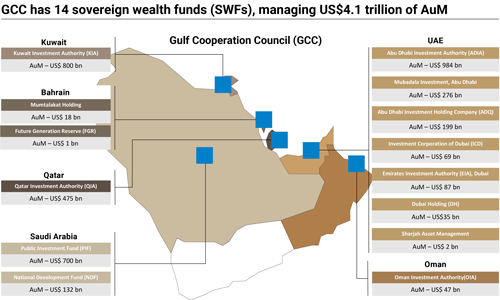The Hottest Topic in Private Banking Right Now
There is one thing that is dominating talk in Swiss finances besides UBS's integration of Credit Suisse and Julius Baer's Signa debacle — the enormous growth potential of the Middle East.
Private bankers return from the region with a sparkle in their eyes and exude an optimism that hasn't been felt for a very long time.
There are two elements driving developments in the Middle East currently. The massive urbanization plans of individual states are likely to unleash enormous capital over the next few years and a new cultural understanding and openness – something that has not been fully recognized in the West.
In principle, the broad outlines of the economically-motivated change in the Gulf Cooperation Council (GCC) have a close similarity to China's reforms under Deng Xiaoping in the late 1970s. Currently, the GCC includes the six states of Bahrain, Qatar, Kuwait, Oman, and Saudi Arabia and the federation of seven United Arab Emirates.
Easing Visa Restrictions
As part of all that Western bankers can now easily and safely go about their business in Saudi Arabia's capital, Riyadh, while Dubai is heavily promoting a large number of sectors, among them education, tourism, and sports. The current efforts reach much farther than past ones, and it is turning the emirate into an international metropolis. It also makes it very clear why there are about 55,000 high-net-worth individuals living there.
They are in a position to profit from golden visas, paying several hundreds of thousands of dollars to acquire long-term residency. Moreover, according to the Dubai International Financial Centre (DIFC), about 250 financial institutions manage about 450 billion US dollars, with more than 100 investment funds being locally administered.
Newest Figures
It is not surprising that the financial industry is extending its tentacles deeper and farther into the region. But the step becomes very logical when you see for yourself the amount of money in the region that needs professional administration and investment.
The talk is of the immense wealth of the region's sovereign wealth funds, with the newest figures (see graphic below) clearly illustrating that most of the money isn't just lying in the more mundane urban atmosphere of Dubai but in Saudi Arabia as well.
(Click to magnify; image; finews.com)
In the past, most of the sovereign funds and near-state vehicles kept most of their assets in the West. An example of that would be the stake held by the government-controlled Qatar Holding in Credit Suisse, or Precision Capital, an investment vehicle of Qatar's ruling family, ownership of Banque Internationale à Luxembourg (BIL, now owned by China's Legends Holding), as well as the Abu Dhabi Investment Authority (ADIA), which holds a stake in American global bank Citigroup.
Arabian institutional investors also hold substantial stakes in European companies outside the finance sector.
Shares in a Super-App
But something has changed in recent years. The sovereign funds and near-government vehicles have been investing in the region, something that has been accelerating local economic growth. Saudi Arabia's Public Investment Fund (PIF) has been putting money into the local entertainment industry through a venture fund. The Abu Dhabi Development Holding Company (ADQ) has been investing in local food and agriculture through a company called Silal while the Kuwait Investment Authority (KIA) has taken a substantial stake in Dubai-domiciled super-app Careem.
The sovereign funds, however, continue to generate high earnings worldwide given they have kept their investment focus on new tech such as Tesla, Zoom, and India's largest private conglomerate Reliance. In the past few years, the five largest sovereign funds have been among the ten most active dealmakers on the planet. The PIF itself has invested more than 30 billion dollars in almost 50 transactions.
Swiss Crypto Specialists
It is therefore no wonder that an enormous pool of wealth is collecting in the Middle East in that context, just waiting to be managed by highly motivated client advisors. The list of Swiss institutions that are breaking ground in the Arabian Gulf grows longer every month, something finews.asia has already reported on. And it is by no means the largest and most international institutions that are setting foot in the new El Dorado of high finance.
Crypto companies are also rearing their head, including Swiss specialist Laser Digital, a subsidiary of Japan-based investment bank Nomura, which has an office in the United Arab Emirates (UAE), offering digital asset services. That is because Dubai isn't only a pulsating city for traditional banks and wealth managers, but it is also the fastest-growing crypto-city in the world.
London to New York to Dubai
It is also why Julius Baer wants to expand its crypto wealth management services in Dubai. The emirate was already early to the game with its «Dubai Blockchain Strategy». More generally, both the UAE and Switzerland are seen as among the most attractive locations for the industry.
The located money set is increasingly being joined by Russians and Chinese who were previously living in London or New York. The West's continued sanctions and the possibility of Donald Trump's re-election as American president have helped reduce the attractivity of the larger Anglo-Saxon cultural sphere.
Indian Millionaires First
Data from Henley & Partners show how attractive the emirate has become for highly wealthy individuals. In 2022, the UAE has the highest influx of millionaires in the world, with 5,200 more high-net-worth individuals moving in than moved out.
HNWIs are defined by Henley as those with investable assets of at least $1 million, with most of them coming from India, followed by the UK, Hong Kong, and China. Before the outbreak of the pandemic in 2020, the UAE traditionally saw a net influx of about 1,000 HNWIs annually.





























